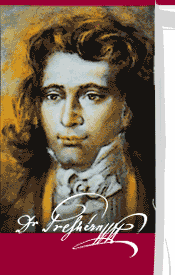| |
|
|
| 1800-21 |
Childhood years spent in Vrba and
with his uncles, school years in Ljubljana |
|
| |
|
|
 |
rance was born into a farmer's family,
as the first son and third child of Šimen and Mina Prešeren.
Research into Prešeren had established his date of birth
as 3rd December 1800, but recently some doubts have surfaced
about this; the Slovene genealogy association, which drew
up a detailed family-tree of the Prešeren family, asserts
that the date of the poet's birth is 2nd December, whilst
on the 3rd he was christened and his name entered in the
register of births. But let us leave the exact date of
Prešeren's birth as a challenge to researchers, whilst
for us the only important fact is that Prešeren was born
at all. The Prešeren's farm, known in the village as 'pri
Ribičevih' was quite modern by the standards applying
in those days, and Šimen was quite a progressive farmer.
In addition to farming, he also grew fruit. Another additional
source of income was transporting various goods: with
his cart and horses he travelled the length and breadth
of Upper Carniola. Šimen decided that France, as his first
son, was to succeed him on the farm. This, however, was
not in line with the plans of the poet's mother Mina.
She was considerably more ambitious than Šimen, as well
as being better educated, and she wanted to enable her
children to break into the middle class. Her sons were
to become priests, a position already acquired by quite
a few members of the wider Prešeren family. Mina taught
her children to read and write, and she sent them away
from home very early - to various uncles who served God
in different parishes. Whilst the daughters worked as
housekeepers for their uncles, the sons were educated.
Šimen did not have much say in the matter.
|
|
| |
France had to leave his native village
of Vrba
when he was just eight years old and he returned home
only during holidays and even then infrequently. Some
of the reasons for the poet's complex personality undoubtedly
lie therein. Prešeren first moved to live with his Great
Uncle Jožef, a priest in Kopanje
near Grosuplje. Uncle Jožef spent two years teaching
him and then enrolled him into the elementary school in
Ribnica. Prešeren was
sufficiently bright and hardworking to fulfil his school
obligations with ease. He was among the best pupils and
his name was entered in the 'golden book' of achievers.
During his years in Ribnica, an event happened that marked
Prešeren for the rest of his life. Even on his deathbed
in Kranj he moaned to his relatives gathered around him
"that it would've been better for me if I'd never been
to Ribnica". Researchers never really established the
background of this statement, but it clearly refers to
an experience which was somehow linked to sexuality. Indeed,
Prešeren's attitude to women was unusual at the very least,
if not bordering on the pathological. But this, too, remains
as a challenge for those studying his life.
|
|
| |
Prešeren attended the third year of
elementary school in Ljubljana.
Here, too, he had no problems with his studies and he
excelled particularly in learning classical languages
and the translation of the Greek and Latin poets. He suffered
no particular hardship, and he earned a little bit extra
by giving private tuition to his less gifted school friends.
For a while, he lived with his younger brother Jožef who,
according to the testimony of their contemporaries, was
the most handsome and the most talented member of the
Prešeren family. Unfortunately, Jožef soon fell ill and
in 1815 died, in only his first year at school. In Ljubljana,
Prešeren met people who accompanied him in one way or
another through the rest of his life: Andrej
Smole, Blaž
Crobath, Miha
Kastelic, Matija
Čop, as well as the "little monk" Anton Martin Slomšek.
Some time during this period, Prešeren realised that he
did not feel the calling for what his mother Mina wanted
most - the priesthood. He was more and more tempted by
law and he decided to go to Vienna,
where he enrolled in the third year of a course in philosophy.
In those days, this was a precondition for the subsequent
study of law.
|
|
| |
|
|
| |
|
|
   |
|
|
|
|


